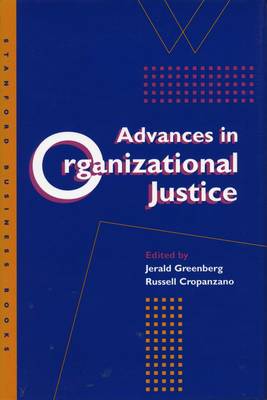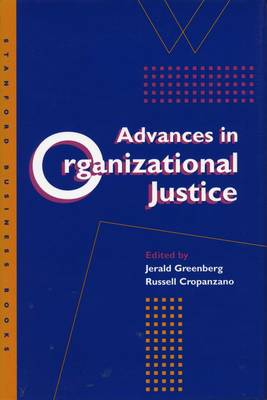
- Retrait gratuit dans votre magasin Club
- 7.000.000 titres dans notre catalogue
- Payer en toute sécurité
- Toujours un magasin près de chez vous
- Retrait gratuit dans votre magasin Club
- 7.000.0000 titres dans notre catalogue
- Payer en toute sécurité
- Toujours un magasin près de chez vous
Advances in Organizational Justice
Description
This is a state-of-the-science book about organizational justice, which is the study of people's perception of fairness in organizations. The volume's contributors, all acknowledged leaders in this burgeoning field, present new theoretical positions, clarify existing paradigms, and identify future areas of application.
The first chapter provides a comprehensive framework that integrates and synthesizes key concepts in the field: distributive justice, procedural justice, and retributive justice. The second chapter is a full theoretical analysis of how people use fairness judgments as means of guiding their reactions to organizations and their authorities.
The subsequent two chapters examine the conceptual interrelationships between various forms of organizational justice. First, we are given a definitive review and analysis of interactional justice that critically assesses the evidence bearing on its validity. The next chapter argues that previous research has underemphasized important similarities between distributive and procedural justice, and suggests new research directions for establishing these similarities.
The three following chapters focus on the social and interpersonal antecedents of justice judgments: the influence that expectations of justice and injustice can have on work-related attitudes and behavior; the construction of a model of the determinants and consequences of normative beliefs about justice in organizations that emphasizes the role of cross-cultural norms; and the potential impact of diversity and multiculturalism on the viability of organizations.
The book's final chapter identifies seven canons of organizational justice and warns that in the absence of additional conceptual refinement these canons may operate as loose cannons that threaten the existence of justice as a viable construct in the organizational sciences.
Spécifications
Parties prenantes
- Editeur:
Contenu
- Nombre de pages :
- 304
- Langue:
- Anglais
- Collection :
Caractéristiques
- EAN:
- 9780804741323
- Date de parution :
- 01-03-02
- Format:
- Livre relié
- Format numérique:
- Genaaid
- Dimensions :
- 152 mm x 229 mm
- Poids :
- 616 g

Les avis
Nous publions uniquement les avis qui respectent les conditions requises. Consultez nos conditions pour les avis.





